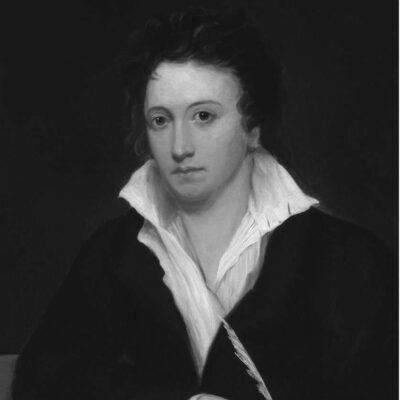Percy Bysshe Shelley

Percy Bysshe Shelley, was born on Aug. 4, 1792, Field near Horsham Sussex England and died on the 8th of July at sea off the caost of Livorno Tuscany Italy. The Romantic poet, whose passionate quest for social justice and personal love, was eventually channeled into his poetry, which to this day is considered to be among the best of the English language.
Young Shelley came from a wealthy background, he was educated at Syon House Academy, then at Eton where he resisted physical and mental bullying by creating an imaginary literary world of his own. Later he went to University College Oxford but was expelled for having written works that went against the doctrines of the time. In 1811 he married Harriet Westbrook the daughter of a London tavern owner, but his grandfather and father disaprooved of the union because it had disrupted their plans for an arranged marriage, therefore they cut off his funds hoping to starve him into submission, but this had the complete opposite effect on the strong willed rebeliou Shelley. In 1812 the couple went to Dublin where Shelley circulated pamphlets advocating political rights for Roman Catholics and free thinking ideals as well as indipendence for Ireland. He later travelled to Devon and Northern Wales where he continued circullating political pamphlets. Eventually due to a lack of money, he returned to London where in 1813 he wrote his first major poem “Queen Mab”which consisted in 9 cantos written in blank verse and lyrical verse, the poem criticised the evils of the past and those of the present, and touched very diverse topics such as; war and commerce, the church, as well as the monachy and eating meat. In 1813 Harriet gave birth to their first daughter Ianthe, but shortly after the poet fell in love with Mary Wollstonecraft Godwin, the daughter of William Godwin.
Going against Godwin’s wishes, the two secretly ran away to France together with Mary’s sister Claire in July 1814. After having travelled through France, Germany and Switzeland they returned to London, but where shunned by the Godwins and a great part of their friends. Shelley was greatly in debt and managed to dodge creditors untill the Birth of his son Charles in 1814. His Grandfather dies in 1815 and provisions for him in the will allowed him to pay his debt and have an annual income. In mid May the threeleft for Geneva to intercept Lord Byron with whom Claire had begun an affair. During this memorable summer on the shores of the lake Geneva, Shelley composed “Hymn to Beauty” and “Mont Blanc” whilst Mary started writting her novel Frankenstein. The party returned to England in September and went to live in Bath. Later that year Shelley’s wife Harriet drowned herself and Shelley and Mary were married in December. In 1817 the Shelleys moved to Marlow where the poet wrote his 12 canto romance epic poem Laon and Cythn and Mary finished writting Frankenstein. Due to health problems owing to the climate and fanancial difficulties the Shelleys and Claire moved to Italy where Byron was residing. Untill this point Shelley’s literary carrer had been politically orineted, but in Italy the poet deepened his understanding of art and literature, but being unable to reshape the world to conorm to his vision, he focused on incarnating his ideas into his poetry. His aim became as he wrot in “Ode to The West Wind” to make his words “ashes and sparks” as from an “unextinguished hearth” therby transforming future generations, and through them, the world. In August 1818 he went to venice to meet Byron and stayed untill October, but during his stay his daughter Clara became ill and died. Following this dreadful event, the Shelleys travelled through Rome to Naples where they remained untill 1819. Settling near Rome, Shelley continued writting “Prometheus Unbound” which he had started writting soon after his daughters death in the Euganean Hills, and set out the outline for “The Cenci” a tragedy based on a case of incestuous rape and patricide in sixteenth-century Rome. He completed this drama in Livorno in 1819 after tragedy had struck yet again with the death of his son William due to malaria. In 1820 the Shelleys move to Pisa, where he was joine by Byron in 1821 here the poet completed only a series of urbane lyrics and started “Charles the First” but never completed the work, this may have been due to the fact that he felt inhibited by the pressencre of Byron. Soon after the Shelleys moved to Lerici, where they were joined by Edward and Jane Williams. Shelley and William set off sail to Livorno to welcome his fellow friend poet Leigh Hunt who had just arrived in Italy to edit a periodical called The Liberal. Unfortunatelly on the return voyage to lerici they were caught in a storm and their boat sank and they both drowned.
